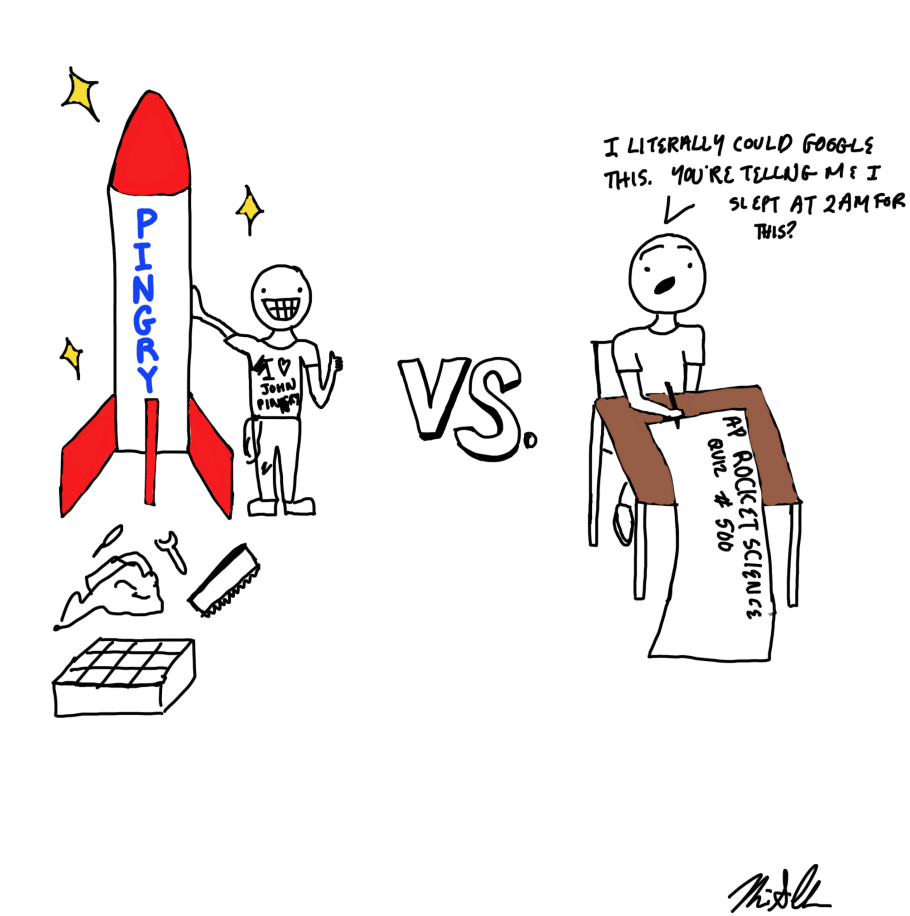By Aneesh Karuppur (V)
When I entered Pingry as a Form III student, I was excited to engage in the team-based, critical-thinking-style learning that Pingry has splashed all over its marketing materials. I bought into the idea of building my foundational knowledge of science and humanities in discussion-based classes. These visions were mostly fulfilled, and I distinctly remember bragging to one of my eighth grade buddies about how different the intellectual discourse was at Pingry.
Experiential learning manifests itself in different ways. From the classroom to research opportunities to global field studies, Pingry has put considerable effort into providing a different type of high school education. However, there is one factor that noticeably lags behind these advancements: tests and assessments. In freshman year, most students had seven final exams. In sophomore year, that number decreased, but remained relatively high (around four to six). Meanwhile, the Pingry Middle School has eliminated finals in favor of Project Week.
Of course, Middle School Project Week isn’t comparable to the capstone assessments needed in the Upper School. However, the concept of a group-based final intrigues me. It led me to think about the nature of tests we have currently at Pingry. While tests may vary by teacher and subject, most contain at least some amount of memorization-based questions. I find these questions, although easier, to be less beneficial to my overall understanding of material than a project or essay. In the internet age, memorization and the ability to recall facts are quickly losing their value. The internet can offer more information at a faster rate than any human can, and with fewer errors.
Because the College Board has completely missed the boat on understanding-based learning, drilling has become necessary in preparation for an AP course or an SAT Subject Test. Nevertheless, Pingry is supposed to be helming that boat, and I wonder what percentage of Pingry tests can be completed with a few Google searches. To better prepare students for the real world, research papers and presentations should replace at least a few tests in each subject.
My first suggestion, the research paper or critical essay, would be beneficial because it serves as a unique application of topics learned in the Pingry classrooms. For example, World History 10 papers are well-respected because topic selection, research, outlining, and writing is done entirely by the student. This allows the teacher to measure a student’s mastery, rather than their ability to regurgitate information. I also believe that the in-class essay ought to be phased out to some extent. Given the tight time constraints, a significant portion of an in-class essay is spent on collating the background facts, leaving much too little time to develop a complex and multifaceted argument. The in-class essay is further hurt by the prohibition of outside research. This forces the entire class to draw from the same bank of information, thus limiting the scope of their arguments.
My second suggestion, the presentation, is a useful tool because it requires brevity and strong communication skills. For example, a teacher could assign groups of students to different days in the homework syllabus, and that group would present the material. This would both demonstrate the students’ understanding and function as a transition into classroom material.
While these changes may seem too drastic to be implemented immediately, I think they should be kept in mind if Pingry wants to keep up its experiential and intellectual style of education. I don’t believe that Pingry’s current assessment system is problematic by any stretch; I simply believe that it is time for the traditional test to step back and let project-based learning have some time in the spotlight.

